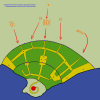MRPolo13
The Arbiter of the Gods
Please do not post on this thread until I say I am finished with it. My lore will most likely be long as I am planning to go into as much historical detail as possible.
Note that this is intended as historical writing from more than one person. This is like an archive written throughout the ages.
The Creation
Also known as "Times Before", with accordanance to the Meronic Book, or "Times ahead" according to the Apocalipta. It's uncertain when exactly the Creation started, though Meronism, the most popular religion in Desertia, states that the Creation started around eighty nine million years BT (Before Thought). It is said to have begun with three minds; that of Truth, that of Lie, and that of Honour, which knew that lies had to be said for truth to prevail.
At first, the Surroundings were created. The pool of black which surrounds Desertia, which brings darkness and kills light when night falls, and which is always defeated by the Sun every morning. This is of course the Meronist interpretation. For example, Desnic interpretation varies greatly; To them Desertia is the eye of a snake, which falls asleep every night and awakens every day (clarification needed; archaeological findings not clear enough; note that Desnitians have been destroyed three centuries ago).
The Creation took eighty million years with findings and beliefs of Meronism. Desertia was created with all the flora and fauna within that time, and at the end of it, the Thoughts were pleased. However, it lacked something. It lacked the balancing, the point of the pyramid. That was when the Three Races were created. Humaren, Eltheren and Detheren.
The races were all given equality; Detheren were short, but were born with intelligence of development, Eltheren were tall and slender, but though lacking strength of Detheren they knew how to take care of trees and crops... only Humaren were given nothing... Nothing but all.
This period was known as the "Times of Tranquillity". It was the period of time where nothing much happened except huge advancements from both Detheren and Eltheren. However, neither of the races could establish working nations, instead continuing to fight in tribal conflicts either amongst themselves or between themselves.
And so for the first thousand years the two races developed greatly, but then for the upcoming millions of years, almost hardly at all, being lost in tribal wars between each other, while Humaren watched, while they learnt, and while they acted.
Note that this is intended as historical writing from more than one person. This is like an archive written throughout the ages.
The Creation
Also known as "Times Before", with accordanance to the Meronic Book, or "Times ahead" according to the Apocalipta. It's uncertain when exactly the Creation started, though Meronism, the most popular religion in Desertia, states that the Creation started around eighty nine million years BT (Before Thought). It is said to have begun with three minds; that of Truth, that of Lie, and that of Honour, which knew that lies had to be said for truth to prevail.
At first, the Surroundings were created. The pool of black which surrounds Desertia, which brings darkness and kills light when night falls, and which is always defeated by the Sun every morning. This is of course the Meronist interpretation. For example, Desnic interpretation varies greatly; To them Desertia is the eye of a snake, which falls asleep every night and awakens every day (clarification needed; archaeological findings not clear enough; note that Desnitians have been destroyed three centuries ago).
The Creation took eighty million years with findings and beliefs of Meronism. Desertia was created with all the flora and fauna within that time, and at the end of it, the Thoughts were pleased. However, it lacked something. It lacked the balancing, the point of the pyramid. That was when the Three Races were created. Humaren, Eltheren and Detheren.
The races were all given equality; Detheren were short, but were born with intelligence of development, Eltheren were tall and slender, but though lacking strength of Detheren they knew how to take care of trees and crops... only Humaren were given nothing... Nothing but all.
This period was known as the "Times of Tranquillity". It was the period of time where nothing much happened except huge advancements from both Detheren and Eltheren. However, neither of the races could establish working nations, instead continuing to fight in tribal conflicts either amongst themselves or between themselves.
And so for the first thousand years the two races developed greatly, but then for the upcoming millions of years, almost hardly at all, being lost in tribal wars between each other, while Humaren watched, while they learnt, and while they acted.
Attachments
-
455.9 KB Views: 29
Last edited:






